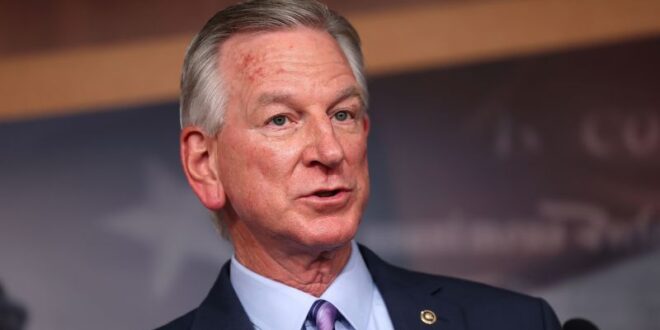Sen. Tommy Tuberville’s hold on Department of Defense nominees is causing growing concerns among institutionalists in the US Senate. The hold has led to approximately 250 military nominees being delayed, including many promotions that would typically be fast-tracked through the Senate. Some senators are now openly questioning if the nominations process needs to be overhauled or if the number of nominations requiring Senate confirmation should be limited.
Sen. Mark Warner, a Democrat from Virginia, suggests the need for a group to come up with rules changes to address this issue. He argues that these tools should be used sparingly and is calling on senators to raise their voices. This concern is shared on both sides of the aisle, as senators are worried about further roadblocks in a Senate that is already lacking in productivity due to divided government.
Sen. Lisa Murkowski, a Republican from Alaska, questions if holding nominees as hostages is becoming a new tactic among senators. While a hold cannot ultimately stop a nominee from being confirmed, it requires valuable floor time from Majority Leader Chuck Schumer, slowing down the process. Tuberville’s hold is particularly impactful because it includes military promotions, which senators argue should not be political nominees.
The root of Tuberville’s hold stems from his opposition to a Pentagon abortion policy. His hold has caused over 250 military promotions and nominations to be delayed, a process that could take months to complete if each one is brought to the floor. This move is seen as a significant obstacle, but Tuberville is not the only senator causing delays. Republican Sen. J.D. Vance has placed a hold on Department of Justice nominees after former President Donald Trump was indicted on federal charges. However, there are only two nominees in the pipeline, and their approval was expected to require significant floor time.
Other senators, such as Vermont independent Sen. Bernie Sanders, have also threatened to oppose Biden administration health nominees in order to push for lower prescription drug costs. Senators express concern that these agency-wide holds are being abused and undermining the Senate’s ability to fulfill its core role.
Sen. Elizabeth Warren, a Democrat from Massachusetts, argues that these holds have become broad and are undermining national security. She views this as further evidence of Congress’s broken state. Sen. Chris Coons, a Democrat from Delaware, warns that the increase in agency-wide opposition is risking the Senate’s ability to perform its essential function.
Some senators are proposing an overhaul of the nomination rules. Independent Sen. Angus King suggests that actions like Tuberville’s hold should require the support of at least five people, rather than just one. However, any changes made to address Tuberville’s holds on military promotions must be carefully tailored to avoid future rules changes by Republicans.
Other options include passing a law that allows military promotions to advance without Senate consent or limiting the number of nominees requiring confirmation, actions that would require bipartisan agreement. Sen. Warner questions if deputy assistant secretaries really need to go through the entire confirmation process. Additionally, the long delay in confirmation often leaves nominees in limbo for six to 12 months.
Sen. Chuck Grassley, a Republican from Iowa, believes in giving each senator as much power as possible but warns against abusing the system to the point that it prompts a rules change. Tuberville defends his hold, arguing that it is within his prerogative to use the rules to his advantage, while Vance stands by his hold against Justice Department nominees due to perceived politicization of the department by Attorney General Merrick Garland.
For now, Democratic leaders are not planning immediate action but are relying on GOP leadership to persuade Tuberville to release his hold. Democratic Whip Dick Durbin hopes reasonable Republicans will come to their senses and help resolve the issue.
 Mind Uncharted Explore. Discover. Learn.
Mind Uncharted Explore. Discover. Learn.
